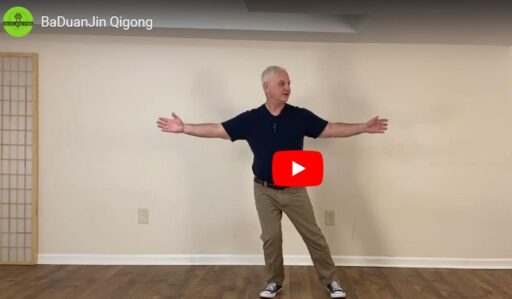Baduanjin Qigong, also known as the Eight Brocades, is a traditional Chinese exercise with a history spanning centuries. It is a form of Qigong that consists of eight movements designed to enhance physical and mental well-being.
Modern research has validated its effectiveness for various health conditions, making it a valuable practice for individuals of all ages.

A video teaching the 8 movements and breathing techniques of Baduanjin is available for ATCQA Members and Certified Instructors/Practitioners. Other people can purchase the class for a small fee on our partner’s website.
1. Balance and Stability Improvement in Older Adults
A comparative study examined the impact of Baduanjin on balance and stability in elderly individuals. Participants aged 65–79 were divided into three groups: a Baduanjin group, a brisk walking group, and a control group. After a 16-week intervention, the Baduanjin group showed significantly better balance performance, with reduced body sway and improved center of pressure control. Notably, the second pose of Baduanjin, which includes knee bending and semi-squatting, contributed to enhanced lower limb strength and stability, reducing fall risk among older adults.
2. Pain Reduction and Functional Improvement in Knee Osteoarthritis
A meta-analysis of 12 randomized controlled trials (RCTs) involving 846 participants found that Baduanjin significantly reduced pain and stiffness while improving physical function in individuals with knee osteoarthritis (KOA). The Western Ontario and McMaster Universities Osteoarthritis Index (WOMAC) scores demonstrated meaningful improvements across all parameters, and no adverse effects were reported. These findings suggest that Baduanjin is a safe and effective complementary therapy for KOA patients.
3. Respiratory Function in COPD Patients
A community-based, cluster-randomized controlled trial compared Baduanjin with conventional pulmonary rehabilitation (CPR) for patients with chronic obstructive pulmonary disease (COPD). After six months, the Baduanjin group showed significant improvements in respiratory function, exercise capacity (as measured by the six-minute walk test), and reductions in anxiety and depression. The results were comparable to those of conventional rehabilitation, making Baduanjin a viable alternative for COPD management.
4. Cardiopulmonary Benefits and Exercise Intensity
A study comparing long-term practitioners of Baduanjin with beginners found significant differences in cardiovascular function. Long-term practitioners exhibited lower resting heart rates and improved heart rate variability. The metabolic equivalent (MET) and oxygen consumption (VO2) measures indicated that Baduanjin is a moderate-intensity aerobic exercise beneficial for cardiovascular health.
5. Motor Function Improvement in Children with Developmental Coordination Disorder
An RCT investigating the effects of Baduanjin on children with developmental coordination disorder (DCD) demonstrated significant improvements in balance and motor coordination after eight weeks of training. Additionally, brain imaging showed increased cortical activation, suggesting that Baduanjin may enhance neural plasticity in children with DCD.
6. Psychological Benefits and Stress Reduction
A 16-week study on sports-disadvantaged college students assessed the psychological effects of Baduanjin. The exercise regimen significantly reduced anxiety, depression, and interpersonal sensitivity while improving heart rate variability (HRV). These results highlight Baduanjin’s potential in mental health regulation and stress management.
7. Fatigue Reduction in Cancer Patients
A randomized controlled trial investigating Baduanjin’s effects on fatigue in lung cancer patients found that it significantly reduced fatigue and pain compared to routine exercise. Given that cancer-related fatigue is a major concern for patients undergoing treatment, Baduanjin may serve as a beneficial non-pharmaceutical intervention.
8. Management of Menopausal Symptoms
A systematic review analyzing 35 clinical trials found that Baduanjin was effective in alleviating perimenopausal mood disorders, including depression, anxiety, and sleep disturbances. For postmenopausal women, it was particularly beneficial in improving bone density and reducing osteoporosis risk. Most studies recommended a practice frequency of 2–3 times daily for optimal benefits.
9. Frailty and Vital Exhaustion in Older Adults
A community-based RCT assessed the impact of Baduanjin on frail older adults. While no significant differences in physical performance were found between the Baduanjin and control groups, participants with higher adherence reported reduced vital exhaustion, a key indicator of frailty. This suggests that consistent practice is necessary to achieve meaningful improvements.
10. Postoperative Pulmonary Rehabilitation
A clinical trial on patients recovering from lung resection surgery due to pulmonary tuberculosis found that a step-by-step Baduanjin program improved lung function and exercise capacity without increasing postoperative complications. These findings support its use in pulmonary rehabilitation programs.
11. Cognitive Benefits for Mild Cognitive Impairment
A meta-analysis of 14 RCTs with 994 participants concluded that Baduanjin significantly improved cognitive function in older adults with mild cognitive impairment (MCI). Notable improvements were observed in memory, executive function, and overall cognitive performance, suggesting its potential as a non-pharmacological intervention for age-related cognitive decline.
12. Emotional Well-Being in Chemotherapy Patients
A systematic review and meta-analysis found that Baduanjin effectively reduced anxiety and depression in chemotherapy patients. A practice frequency of once per day yielded the most significant improvements, making it a promising complementary therapy for emotional well-being in cancer patients.
Conclusion
Baduanjin Qigong is a versatile and evidence-based exercise system that promotes balance, reduces pain, enhances respiratory and cardiovascular function, improves cognitive and psychological well-being, and supports rehabilitation. Given its accessibility and low-intensity nature, it can be incorporated into various health and wellness programs, particularly for older adults, individuals with chronic diseases, and those recovering from illness or surgery. Future research should continue refining best practices to optimize its benefits across diverse populations.